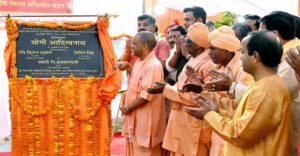 Moon Desk: The Narendra Modi-led government’s drive to remake India as a Hindu nationalist state has instigated states of emergency since the 2019 national elections. Long-standing techniques in militarised governance habitual to the administration of India-administered Kashmir are being regularised across India as this new authoritarianism unfolds, unchecked by international attention or consequences.The targeting of independent media, massive corporate and economic corruption, increasing collapse of law and order, impunity laws, vengeful circulation of nationalist propaganda and hate speech, and political, gendered and sexualised violence are aggressively persistent. Human rights defenders, journalists, scholars, students, allies and their principled articulations are being criminalised as anti-national. The repression of caste-oppressed groups, foremost of Adivasis and Dalits, and the minoritisation of non-Hindu communities, is rampant. Calls to genocidal violence via the extermination of Muslims and dog whistles to foment vigilantism among Hindu nationalists, reverberate.
Moon Desk: The Narendra Modi-led government’s drive to remake India as a Hindu nationalist state has instigated states of emergency since the 2019 national elections. Long-standing techniques in militarised governance habitual to the administration of India-administered Kashmir are being regularised across India as this new authoritarianism unfolds, unchecked by international attention or consequences.The targeting of independent media, massive corporate and economic corruption, increasing collapse of law and order, impunity laws, vengeful circulation of nationalist propaganda and hate speech, and political, gendered and sexualised violence are aggressively persistent. Human rights defenders, journalists, scholars, students, allies and their principled articulations are being criminalised as anti-national. The repression of caste-oppressed groups, foremost of Adivasis and Dalits, and the minoritisation of non-Hindu communities, is rampant. Calls to genocidal violence via the extermination of Muslims and dog whistles to foment vigilantism among Hindu nationalists, reverberate.
Uttar Pradesh has a population of approximately 200 million people, including 38 million Muslims. The incumbent head of state, Yogi Adityanath/Ajay Mohan Bisht, became chief minister in 2017 and was reelected in 2022. In a video that surfaced in 2014, Adityanath reportedly stated: “If [Muslims] take one Hindu girl, we’ll take 100 Muslim girls. If they kill one Hindu, we’ll kill 100 Muslims.”
Adityanath has supported various campaigns to weaken and override the rights of Muslims. This has emboldened Hindu nationalism, including far-right organisations such as the Rashtriya Swayamsevak Sangh, which in 2017 reportedly operated 8,000 shakhas or branches in UP. In 2018, RSS leader Mohan Bhagwat stated that the organisation was positioned to mobilise an army within three days. The Adityanath government began a process to withdraw 131 criminal cases against alleged perpetrators in the Hindu-led mass violence against Muslims in Muzaffarnagar in 2013, and in 40 of 41 Muzaffarnagar cases, including in four gang-rape cases, the accused were acquitted. In January 2019, the prime accused and 16 others out on bail in the 2015 lynching of Mohammad Akhlaq were seen cheering at the front of an Adityanath rally.
An unnerving 23,612 events of riots/organised violence were reported in UP during 2017-2019, while 6,126 such events were reported in 2020, and 5,302 in 2021. In December 2018, four United Nations Special Rapporteurs wrote to the Government of India regarding extrajudicial killings by police officers in UP between March 2017, when the Bharatiya Janata Party government took power, and June 2018. Extrajudicial killings and custodial torture from March 19, 2017 to September 28, 2021 include “encounter” cases where police reportedly shot individuals in street protests and enacted custodial deaths, victimising individuals on the basis of their religion and caste. Women experienced violence, including in police custody. There is no reporting on LGBTIQA-identified persons. UP officials with alleged direct responsibility for extrajudicial killings and/or torture of civilians that took place between March 2017 and September 2021 include police personnel in the rank of Deputy Superintendent of Police, district level Superintendent of Police and Constable. Adityanath, the highest executive functionary in UP, is routinely also its Home Minister. The UP police is under the command of the Chief Minister, as the “law and order” portfolio is a state responsibility per the Indian Constitution. Police leadership includes the Principal Secretary, Additional Chief Secretary, and the Director General of Police. Any statement made by a Chief Minister which encourages the police to violate the law therefore may amount to an abetment of the crime. Punishment for abetment of an offence is customarily stringent and a Chief Minister may, therefore, be charged with abetment provided that the main offence is established.
In 2022, Prime Minister Modi attended Adityanath’s swearing-in ceremony. In December 2022, Adityanath reportedly asserted that opposition parties, the Congress and Aam Aadmi, “should be hanged” as they were impediments to India’s progress. In February 2023, Adityanath reportedly claimed that: “India is a Hindu Rashtra [nation], because every citizen of India is a Hindu.”
Absolute nationalism targets those marginalised across India, particularly its Muslim inhabitants. Making aggression ordinary presents violence as inevitable and, in the context of India’s emergence as a global player, crisis and militarisation as propitious to national enterprise. The use of hate and arbitrary power and calculated killings by Hindu nationalists reveal an ominous disregard for democracy, a forewarning of what is to come.





